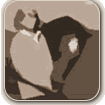Jennifer MacKenzie is an agricultural photo journalist with almost 30 year's experience. Operating from her base in Cumbria, Jennifer undertakes mainly industry-related freelance writing and photography.
Hill suckled calves win leading awards
Suckled calves produced by a Pennines hill farming family have gone on
to win leading primestock events.
A black heifer shown by the Lee family of Agars Hill, Whitfield, near Hexham at the National Beef Association’s Beef Expo event at Hexham Mart in May when she won the baby beef reserve title, caught the eye of Devon show enthusiasts Mike and Melanie Alford, of Cullompton.
They bought the heifer which they called Alejandro in a private deal with Stephen Lee and their 660-mile round trip to Harrison & Hetherington’s Borderway Agri Expo in October paid off when she was awarded the supreme cattle honours by judge Arfon Jones out of a record 248 entries.
Mr Jones said: “The champion took my eye as soon as she came in to the ring.” He described her as very, very neat from her neck through to her hind quarters, compact and handled well.
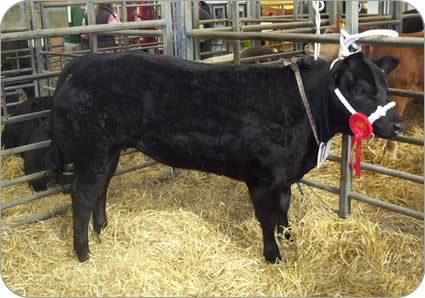 |
| The heifer when it was shown by the Lees at Beef Expo in Hexham |
At the following month’s Scottish Winter Fair, Alejandro secured the lightweight heifer and overall championships as well as the overall championship. Weighing in at 520kg, she sold for a £10,500 (£20.19/kg) to Stillmans Butchers, Somerset.
The heifer is testament to the type of cattle bred by Stephen Lee, who farms with his father Forster, and brothers Michael, who runs the sheep enterprise and Keith who deals with the machinery and tractor work, on five farms, four at Whitfield and one near Corbridge. Stephen’s 17 year old son, Sam, also works at home.
The Lees’ other big success was when they bred the 2005 winner of both the English and Scottish Winter Fairs at 19 months old, owned and shown by Neil Slack, of Newby, Shap.
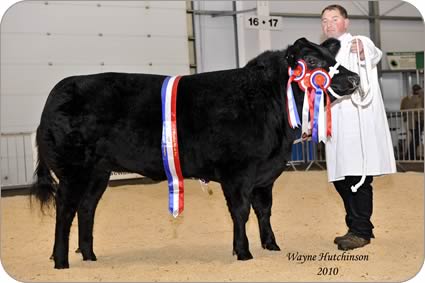 |
| Alejandro Scottish Winter Fair Champion |
Sparky, a Waindale Patrick daughter out of a Limousin-cross dam was also interbreed champion at the Northumberland County Show that year in Mr Slack’s hands.
The family first started farming at Whitfield in 1919 when Forster’s grandfather took on the tenancy of Agars Hill. Now they also farm another three tenanted units, Dodd Bank, Todd’s Burn and Beaufront Red House, Corbridge, and own Fell House, Whitfield.
They run a herd of 200 Limousin cross British Blue cows, selling the calves at Hexham and Carlisle. There is also a flock of 600 Swaledales, 100 of which are bred pure, along with 600 crosed ewes which are North of England Mules, Texels, Dutch Texels and Bluefaced Leicesters. There is also a small herd of pedigree Limousins.
“We buy a number of pedigree bulls from society sales in Carlisle but the sire of Alejandro was a Limousin cross Blue bull bred by Brian Hall, Ainstable Hall, which caught my eye as a calf,” said Stephen.
“Even at six months old I could see the bull’s potential. He was well-muscled and had good top shoulder and a good top line but was not too heavy-boned because I mainly wanted him to breed our own replacements. Three quarter Limousin, a quarter British Blue cow works best for us. This bull has done very well for us.”
The first of the heifers by the bull are due to calve next spring to the Limousin bull.
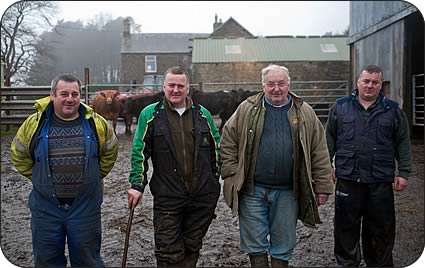 |
| The Lees, left to right, Keith, Stephen, Forster and Michael |
The Lees are prepared to invest in their stock with current pedigree Limousin bulls selected on conformation being bred by the Harrymans at Keskadale, the Handleys, Gunnerfleet and Matthews, Greenfield.
The first Limousin bull was bought in 1994 at Carlisle in what was a ‘natural progression’ to meet market requirements, moving from the Charolais crossed with Angus cross cows and before that Herefords.
While some replacements are home-bred, more currently are being bought in to prevent bulls being used on their daughters.
Calving is twice a year from March to May and from August to October. Calves are sold at a number of sales, mainly in Hexham, although some calves with show potential have been sold at Carlisle as young as four to six months old.
In fact, their top price of £1,800 at auction was for the reserve champion calf at Carlisle which was only four months old. Unfortunately, foot and mouth and TB restrictions at the time prevented the Derbyshire purchaser Jane Bonsall from showing her.
The bulk of the calves are sold through Hexham Mart at around 12 months old. Bullocks sold recently averaged £828 out of the black and white cows and £770 out of the red cows with heifer averages mirroring those of the steers but at £40 less.
The Lees have a lot of purchasers who keep coming back for their cattle, many of whom are finishing for the private butcher.
Bought in replacements all of which have been beef-bred for a number of years now are sourced at various centres in the region and are purchased at around 12 months old to allow them to acclimatise to the farm with land which runs to 1,000ft above sea level before they go to the bull six to eight months later.
Winters are long and harsh so cows are usually housed from mid-October with turnout mid May.
Autumn-born calves are weaned on August 1 when their dams begin calving again and the spring born calves are weaned at housing.
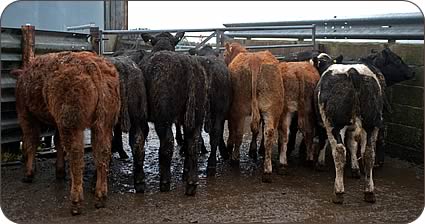 |
| Suckled calves (in their working clothes |
The calves are fed at either end of the day pellets and barley grown on 22 acres at the Corbridge farm to make up a 16 per cent protein diet. The spring born calves at housing are dosed for worms and their backs scraped which helps prevent pneumonia.
Health is a priority and the autumn calving cows get two mineral and trace element boluses with copper, cobalt, iodine and selenium, which helps them get back in calf. The spring calving cows will bet the same treatment next year.
The cows are injected against BVD, e-coli and rotavirus and they are given Synulox tablets.
The Lees started their own Churchburn herd of pedigree Limousins in 2000 with a six month old heifer and the herd has four breeding females with a view to breeding crossing bulls and eventually some to sell. So far the herd has mainly produced females.
The farm has been in the Pennines Area of Outstanding Natural Beauty for the last three years, in a 10-year agreement.
